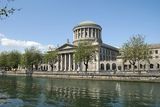Daily Covid cases could drop to 500 a day by festive season
The number of daily Covid-19 cases could fall below 1,000 next month and drop as low as 500 as we approach Christmas, based on the current trajectory of the disease, the Government has been told.
A briefing made available to Health Minister Stephen Donnelly and the National Public Health Emergency Team (Nphet) last week shows Ireland is currently tracking along one of the more optimistic modelling scenarios.
This assumes children have a low susceptibility to contracting Covid-19. In particular, it assumes children under 12 are 50pc as susceptible to infection as adults.
Based on this scenario, the current modelling shows case numbers will continue to decrease over the coming months, going below 1,000 a day next month and perhaps falling to 500 in the run-up to the festive season.
However, the modelling also contains other scenarios that demonstrate the possibility of a further wave of the disease, in the event the expected increase in people’s social contacts in the coming weeks leads to higher levels of transmission.
The Government will take further public health advice and monitor the impact of the return to the office and the return of students to third-level institutions before deciding whether to lift the last remaining public health restrictions — except for the mask requirement on public transport and in shops — on October 22.
This would allow for the reopening of nightclubs and other venues, while the requirement for a Covid certificate to gain entry to hospitality venues is expected to be allowed to lapse when the legislation underpinning it expires on October 9.
Mr Donnelly was presented last week with data from Nphet that showed that while the State’s incidence rate is still high, it is decreasing, with the seven-day average of new cases standing at 1,281, down from around 1,800.
The incidence rate of the disease in young adults aged 16 to 24 has reduced by 60pc compared with early August, indicating the uptake of vaccination by younger people is having a marked impact.
Higher Education Minister Simon Harris announced yesterday that pop-up vaccination clinics would open across many college campuses this month. More than 83pc of people aged between 16 and 29 have had a first dose, with more than 78pc fully vaccinated, he said.
“These pop-up vaccination centres will be in addition to the regular vaccination centres, which already operate in some colleges for the general public and in addition to a plan to ensure vaccinations can be accessed through student GP services,” he told his Twitter followers.
“This is all about making it as easy as possible for every student & indeed staff member to avail of full vaccination & the protection that provides.”
Mr Donnelly was also told a surge in demand for testing in primary school children, which has resulted in thousands of young students being forced to stay at home because they are deemed close contacts, did not match a corresponding increase in incidence.
Nphet is to decide at the end of this month if the transmission of Covid-19 in schools will allow for children with no symptoms who are close contacts to no longer be automatically tested and told to stay home for up to two weeks.
Meanwhile, HSE chief executive Paul Reid said on his Twitter feed yesterday that “a hugely disproportionate number of unvaccinated patients” account for admissions to intensive care units.
Of the 301 people admitted to ICU with confirmed Covid-19 infection between April 1 and September 11, 204 reported not having received a Covid-19 vaccine.
Only 57 received all recommended vaccines, with 51, or less than a fifth, classed as breakthrough infections, in that they were fully vaccinated and more than 14 days after their second dose.
Join the Irish Independent WhatsApp channel
Stay up to date with all the latest news














